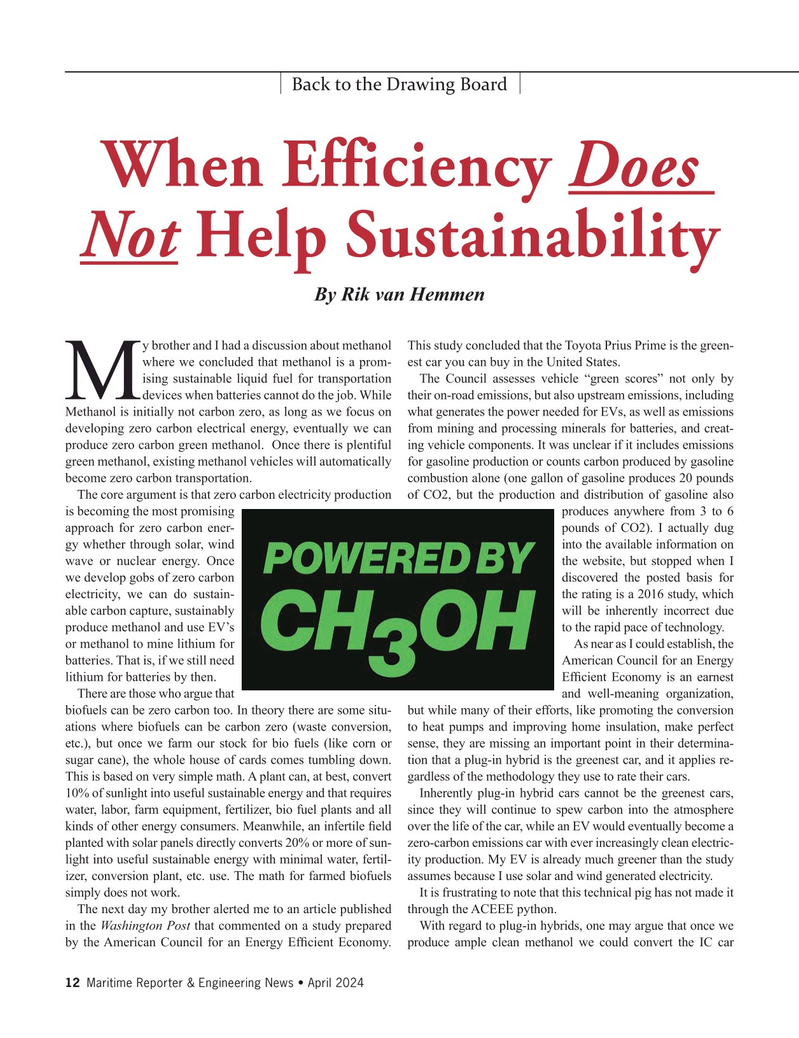
Page 12: of Maritime Reporter Magazine (April 2024)
Read this page in Pdf, Flash or Html5 edition of April 2024 Maritime Reporter Magazine
Back to the Drawing Board
When Efficiency Does
Not Help Sustainability
By Rik van Hemmen y brother and I had a discussion about methanol This study concluded that the Toyota Prius Prime is the green- where we concluded that methanol is a prom- est car you can buy in the United States. ising sustainable liquid fuel for transportation The Council assesses vehicle “green scores” not only by
Mdevices when batteries cannot do the job. While their on-road emissions, but also upstream emissions, including
Methanol is initially not carbon zero, as long as we focus on what generates the power needed for EVs, as well as emissions developing zero carbon electrical energy, eventually we can from mining and processing minerals for batteries, and creat- produce zero carbon green methanol. Once there is plentiful ing vehicle components. It was unclear if it includes emissions green methanol, existing methanol vehicles will automatically for gasoline production or counts carbon produced by gasoline become zero carbon transportation. combustion alone (one gallon of gasoline produces 20 pounds
The core argument is that zero carbon electricity production of CO2, but the production and distribution of gasoline also is becoming the most promising produces anywhere from 3 to 6 approach for zero carbon ener- pounds of CO2). I actually dug gy whether through solar, wind into the available information on wave or nuclear energy. Once the website, but stopped when I we develop gobs of zero carbon discovered the posted basis for electricity, we can do sustain- the rating is a 2016 study, which able carbon capture, sustainably will be inherently incorrect due produce methanol and use EV’s to the rapid pace of technology. or methanol to mine lithium for As near as I could establish, the batteries. That is, if we still need American Council for an Energy lithium for batteries by then. Ef? cient Economy is an earnest
There are those who argue that and well-meaning organization, biofuels can be zero carbon too. In theory there are some situ- but while many of their efforts, like promoting the conversion ations where biofuels can be carbon zero (waste conversion, to heat pumps and improving home insulation, make perfect etc.), but once we farm our stock for bio fuels (like corn or sense, they are missing an important point in their determina- sugar cane), the whole house of cards comes tumbling down. tion that a plug-in hybrid is the greenest car, and it applies re-
This is based on very simple math. A plant can, at best, convert gardless of the methodology they use to rate their cars.
10% of sunlight into useful sustainable energy and that requires Inherently plug-in hybrid cars cannot be the greenest cars, water, labor, farm equipment, fertilizer, bio fuel plants and all since they will continue to spew carbon into the atmosphere kinds of other energy consumers. Meanwhile, an infertile ? eld over the life of the car, while an EV would eventually become a planted with solar panels directly converts 20% or more of sun- zero-carbon emissions car with ever increasingly clean electric- light into useful sustainable energy with minimal water, fertil- ity production. My EV is already much greener than the study izer, conversion plant, etc. use. The math for farmed biofuels assumes because I use solar and wind generated electricity.
simply does not work. It is frustrating to note that this technical pig has not made it
The next day my brother alerted me to an article published through the ACEEE python.
in the Washington Post that commented on a study prepared With regard to plug-in hybrids, one may argue that once we by the American Council for an Energy Ef? cient Economy. produce ample clean methanol we could convert the IC car 12 Maritime Reporter & Engineering News • April 2024
MR #4 (1-17).indd 12 4/5/2024 8:38:04 AM

 11
11

 13
13
